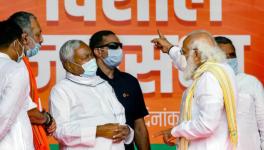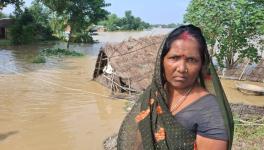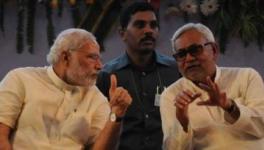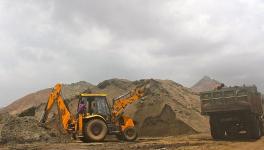Bihar Elections: Musahar Village’s Lost Hope in Bill Gates Promises of Development
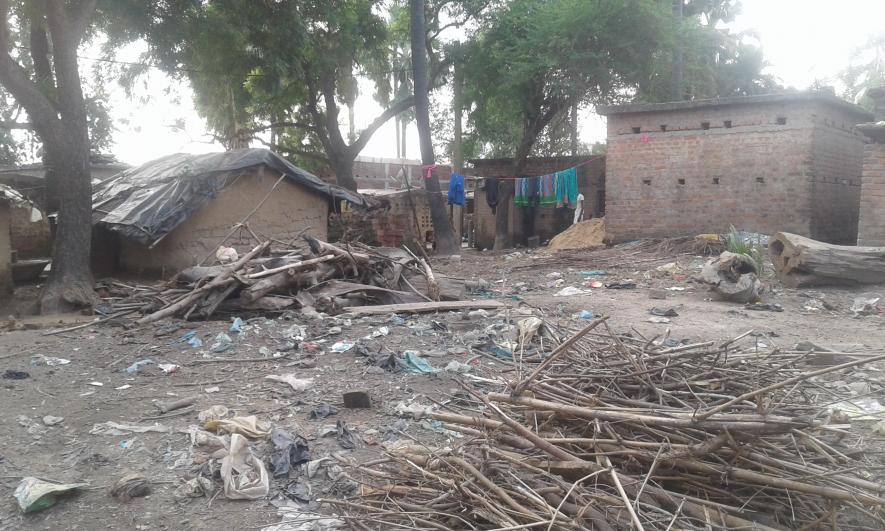
Jamsaut Musahari (Bihar): Nearly nine and half years ago, Runti Devi was happy, excited and hopeful that her few months old daughter Rani will be a lucky child after Microsoft founder Bill and his wife Melinda Gates, during their visit to the village, took her in their lap, expressed their love and promised to help. However, Runti was proved wrong as several years later no help has come for Rani,who is now almost 10 years old. She is like any other poverty stricken Mushahar girl, clad in dirty cloth, in this village; playing with children of her age at a nearby open space full of filth and bad smell, with stray dogs and pigs wandering around.
Runti and Rani belong to the oppressed Mushahar dalit community, known as one of India's most marginalised ones in the caste hierarchy and are still considered untouchable. As the Assembly elections approach in the state, the plight of the oppressed and neglected community, has not found a place in the election campaign.
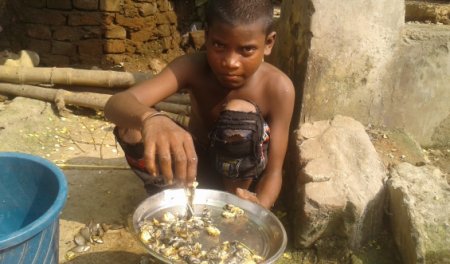
Runti, sitting on the ground outside the wooden door of her one room brick house to get fresh air for some relief on a humid day on a October afternoon at Jamsaut Musahari under Danapur block about 19 km from Bihar’s capital Patna, did not want to recall promises of “achche din” by Bill and Melinda Gates, one of the world’s richest couples. However, she remembers that Rani’s picture in the lap of the couple, who sat on the ground under a neem tree in the middle of the village surrounded by people, was publicised widely and her daughter became a household name. “Soon after that, several people told me that Rani’s life will change for sure as Bill and Melinda Gates are going to support the family and Rani will get good education facility,” she said.
“Angrez saheb aur Gori Mem saheb ke jayeke baad Kutch na holwa. Ek go rupiah bhi nahi milal. Humni ke Jeevan na badlal. Rani garibe rah gelai, ab humra koi bharosha bhi na hai, na hum yaad kare chahi (After the English man and his White wife left, nothing happened. I didn’t get a single penny. My life did not change a bit. Rani remained poor, now I don’t have anymore trust nor do I want to remember that),” the mother of four, who cannot pronounce Bill and Melinda Gates’ names, said, describing them as Angrez (English rich man and his White wife). She has no idea about the billionaire philanthropists and their foundation.
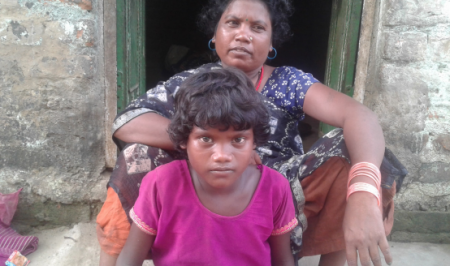
Ten year old Rani cannot read and write, and spends most of her time playing, often in hunger. “I want good food, clothes, biscuits and chocolates,” she said in a mix of Hindi and a local dialect spoken by the Mushahars.
Runti said that her young co- villagers informed her that Bill and Melinda Gates could help Rani if her miserable life story reached them. “We want help to educate Rani and my other children and to live a better life,” she said.
Her daughter was enrolled in the one room government run primary school in the village but she hardly attended classes, Asma Kumari, a teacher at the school said. Anita Devi, a Tola Sewak appointed by government from the dalit community, to work to ensure cent percent attendance of children in school said that Rani attends school only when they brought her personally.
Runti along with her husband Sajan Manjhi work mainly as landless farm labourers during plantation season of paddy, wheat, pulses and at the time of their harvesting. In the off season, Manjhi earns his livelihood by working odd jobs. “It is difficult to get work every day and sometimes we do not get anything more than rice and pickle to eat,” he said. Their second son, who is 13, collects snails from dirty water bodies and sometimes catches small fish to cook.
Asharfi Sada, president of the Musahar Vikas Manch, which works to raise awareness among the community, said Bill and Melinda Gates visited Jamsaut and took Rani in their lap for publicity purpose. “It was nothing more than a well planned photo shoot to boost their image at the cost of the poor,” he said.
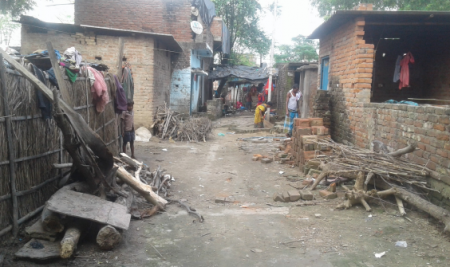
Sada, one of the first few Musahars to earn a postgraduate degree in 1991, has devoted his life for the cause of his community. He said, “Only government intervention can change life of this community because NGOs work on project basis.”
Runti is not alone. Most of the residents of this village are poor, landless and illiterate Mushahars, who are upset over the failing of their hope for change and development in their life owing to the much hyped visit of Bill and Melinda Gates some years ago. For centuries, the community has been living on the outskirts of powerful, landed upper or dominant caste villages of Bihar.
“Nothing has changed for Runti and Rani as well as for all of us. We expected something after Bill and Melinda Gates gave us hope to develop our Mushahari tola as a model village. We are still living the way we were living a decade ago,” Ravindar Manjhi, a landless farm labourer, who earns livelihood by working in the field of big farmers of nearby villages of powerful upper castes and OBCs said.
As Manjhi said, development is still a distant dream for the resident of this ghetto. The first thing one encounters on reaching Jamsaut is the foul smell hanging in the air. Ironically, only a few kilometres away from here, new posh residential localities and costly high rise apartments are coming up in Patna.
Manjhi said livelihood and joblessness are two major problems among landless residents here. They are mostly working as farm labourers followed by daily wage workers in the construction sector and some are working as sanitation workers with Patna municipal corporation. “During lockdown most of us were jobless. Later in July, we got work as farm labourers. Now we are waiting for paddy harvesting work to earn livelihood,” he said.
Dukhni Devi, a mother of three children, said she has a ration card but the local PDS dealer is not providing her ration since the lockdown began in March. “We are on verge of starvation as there is no work. My husband is jobless for months,” she added.
A middle aged villager, Shahdeo Manjhi, said, “After the Gates visited us, no one has come from their foundation to inquire about us.” While, a team from the Gates foundation did visit the village in 2011 for a survey on health, nothing more has happened so far. “A doctor sometimes visits but we hardly get free medicines or any other health facility,” Shahdeo said.
For example, young Avdesh Manjhi is partially blind and his pregnant wife Mamta Devi is suffering from acute anaemia, due to lack of virtually no livelihood. The helpless couple have been struggling with no hope of help from the government as well. “We are living in a small hut type one room house. Neither a toilet was constructed nor a house under Pradhan Mantri Gramin Awas Yojana formerly known as Indira Awas Yojna,” he said.
Similarly, young Minta Devi, mother of one, said that, “No one cares for poor like us. I have no toilet and no ration card. My husband is a daily wage labourer who helps us to survive.” Minta’s voice was echoed by Punia Devi, who also does not have a ration card. She added, “A toilet was constructed for me like some others.”
Dipak Manjhi, a young elected ward member of Jamsaut, said, “Concrete roads were constructed in some narrow lanes, few hand pumps and facilities of water installed in the village and toilets have been constructed for several households under different schemes by the government. But he admitted that there are many mud lanes, open drains and there are houses without toilets that forced them to go for open defecation in nearby fields.”
Krishna, Minta, Avdesh, Mamta and Ravinder’s story reflects the lives of over three million Musahars living in hamlets spread across drought-prone Central and South Bihar and flood-prone North Bihar. Their socio-economic status has not changed much in recent years.
In Bihar, 96.3% of Musahars are landless and 92.5% work as farm labourers. The figures have not changed much since the 1980s. Literacy in the community is 9.8%, the lowest among dalits in the country. Hardly 1% of Musahar women are literate.
The plight of Musahars can be imagined from the fact that they are still not allowed to live anywhere in Bihar except in hamlets earmarked exclusively for them.
Get the latest reports & analysis with people's perspective on Protests, movements & deep analytical videos, discussions of the current affairs in your Telegram app. Subscribe to NewsClick's Telegram channel & get Real-Time updates on stories, as they get published on our website.












